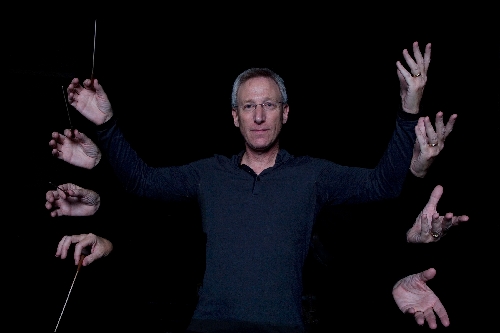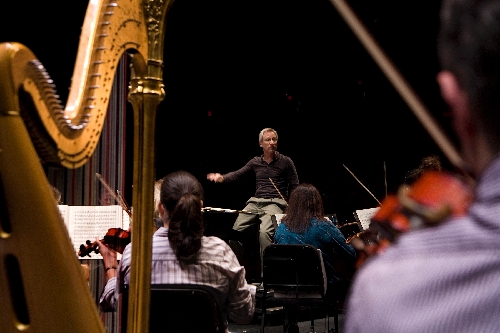Conductor David Itkin stays on the go but anchored to Las Vegas Philharmonic
Peripatetic (adjective): David Itkin.
Not in the dictionary? Should be.
Most three-job jugglers don't have time for interviews, but Itkin, the 54-year-old conductor/music director of the Las Vegas Philharmonic since 2007, made time recently before a rehearsal for next Saturday's double holiday concerts (2 and 8 p.m.) at the University of Nevada, Las Vegas.
Pinballing between conducting our Philharmonic and the Abilene (Texas) Philharmonic and heading the orchestral studies program at the University of North Texas, Itkin is a bona fide mobile maestro:
Question: Where do you consider home?
Answer: If home is where your family is and where you pay the mortgage, then it's Dallas.
Q: How do you split your time between the two philharmonics?
A: Somewhere between eight and 10 weeks a year, I'm here. Somewhere between four to five weeks a year, I'm in Abilene.
Q: Three jobs -- why are you so driven?
A: It's not uncommon for conductors to have more than one job. I find it a very healthy thing because the relationship between a conductor and a group of musicians either grows over time and becomes richer, or it gets stale and dull. If you spend 20 to 30 weeks a year with the same musicians in the same room, no matter how fabulous everybody is, it can become stale fast. Every time I come here and I walk into the room with the musicians I'm excited.
Q: Does it ever become draining being such a frequent flier?
A: Actually, I hate flying. One little pill that my doctor gives me gets me through it. It's mostly helpful to the people sitting near me. I'm constantly holding onto the seat going, "huuuh, huuuh."
Q: Is there a healthy audience for a philharmonic orchestra in Las Vegas?
A: The audience is here, but audience development in the 21st century is getting harder all the time. It's an added level of difficulty in Las Vegas. There aren't four generations of people who hand down symphony tickets to the next generation. The history of the serious arts here is young and spotty.
Q: Is the situation here unique because of your musicians who play on the Strip?
A: When you've played the same show eight times a week, people of this quality are so ready to play some great music. They come in so ready to rock. And the people who play the shows that are long runs, they take the week off when it's a philharmonic week because there's more rehearsals, and they're losing money. We pay a respectable scale, but it's not what they get paid to play on the Strip. It's an illustration of their dedication.
Q: You composed a film score for the 2007 movie "Sugar Creek." Are you proud of that?
A: The movie went straight to video, and it was lucky to go to video. The movie got ruined in editing. I busted my hump to get this done. Some of it I really liked; it was good work. Everything lined up in the recording.
I go to the theatrical premiere and I'm psyched. I know what's coming. There's titles and then there's a black screen and then the orchestra starts and it launches into the first scene. The movie starts, the first scene is completely different and the music is not there. In the background I can hear teeny snippets of the score and it's mostly covered by sound effects. (His wife, Teri) thought I was going to have a heart attack.
Q: You also wrote the oratorio "Exodus" about the Jewish exodus from Egypt to escape slavery, which debuted in 2005 in Little Rock, Ark. What inspired it?
A: I always found the Passover Sedar a very inspiring experience, and I realized that since Handel, there hadn't been a serious piece of music about that story.
Q: You got William Shatner to narrate. What was it like working with him?
A: A blast. Shatner was on a huge high, in the middle of doing "Boston Legal." I was concerned about the whole Denny Crane thing, that he was so famous now for doing comedy, and I didn't know the man.
He was so nice, so dedicated to doing a really outstanding job, as you can hear on the recording (available on iTunes). No screwing around, charming as a person to be around. Took everything very seriously and I really appreciated that.
Q: During your off-time, what music do you enjoy listening to?
A: I love James Taylor and the Beatles and old pop and rock. I hate country with a white-hot passion. It's not because I'm a classical music snob. I just hate it.
Q: Is the Las Vegas Philharmonic on the right track?
A: I'm so thrilled with what the orchestra does every time I come here. We're going to go into The Smith Center in March. This is a whole new stride. What we're going to learn as an orchestra by being in a first-class hall where we can hear each other (because of better acoustics than at UNLV's Artemus Ham Hall), having a higher level of sensitivity to sound. We're just getting started. I've had commuting jobs before where I was not excited to come, so I let them go. I plan to be in Las Vegas for a long while.
Contact reporter Steve Bornfeld at sbornfeld@reviewjournal.com or 702-383-0256.





























